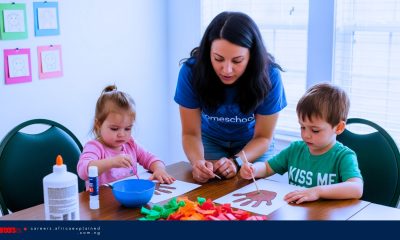Canada Sponsorship
Early Childhood Assistant Is Urgently Needed In George Brown College – Toronto, ON

Job details
Location: Toronto, ON
Salary: $26.47 an hour
Job type: Hybrid remote
Shift/Hours: Morning, night, overnight
About Us:
George Brown College prides itself on educating students through real-world learning, in the heart of Toronto. Our faculty and employees make this vision a reality, and we support them by making George Brown a great place to work. See why we are consistently ranked as one of GTA’s top employers.
Why work here?
George Brown College offers hybrid work opportunities, a competitive pension plan, generous holiday and vacation time, a tuition assistance program, discounted rates for employees taking Continuing Education courses, and an equitable work environment where everyone matters.
George Brown College is committed to accommodating applicants with disabilities throughout the hiring process, in accordance with the Accessibility for Ontarians with Disabilities Act (AODA). Candidates who require accommodation in the hiring process may contact TalentAcquisition@georgebrown.ca confidentially.
Land Acknowledgement
George Brown College is located on the traditional territory of the Mississaugas of the Credit First Nation and other Indigenous peoples who have lived here over time. We are grateful to share this land as treaty people who learn, work, and live in the community with each other.
Equity Statement
George Brown College is committed to creating and sustaining an equitable and inclusive learning and working environment. We encourage and actively seek applications from Indigenous, Black, racialized people, visible minorities, 2SLGBTQIA+ persons, all genders, and persons with disabilities.
Key responsibilities:
- Assists in the implementation of posted indoor and outdoor daily activities; assists with the ongoing supervision of playroom, playground, group, and routine activities.
- Assists the ECE staff in ensuring the overall health and safety of children enrolled in the program by maintaining a sanitary and safe environment and identifying children who are unwell.
- Assists with arranging children’s play space to reflect the philosophy of the curriculum.
- Builds and maintains responsive relationships with individual and groups of children in care.
- Assists the ECE Staff in the developmental assessment of individual children based on observations; establishes and maintains effective communication with parents and student teachers by sharing daily information regarding children’s activities, programs, special events, etc.
- Assists with the daily preparation of the playground and playroom; cleans/organizes equipment and other areas of the centre as needed.
- Demonstrates a professional approach by maintaining currency of theory used at the centre and in other areas related to the field of Early Childhood Development.
- Collaborates with the Centre Manager and team members to share expertise and practical knowledge.
- Participates in Centre and program development meetings.
- Provides care-giving routines such as toileting, serving meals, rest time, cloakroom (dressing children to go outside, etc.).
- Keeps playroom and other facilities tidy and clean by following prescribed “cleaning routines”; performs various housekeeping duties, such as laundry.
- Performs other related duties as assigned.
Educational and Experience Requirements:
- Early Childhood Assistant Certificate (one year Community College program) or equivalent and First Aid and CPR Certificate.
- Must have health assessment and immunization as required by the Ministry of Education.
- More than six months and up to one year of practical related Early Childhood experience.
Skills and Attributes:
- Excellent English communication, problem solving, and human relations skills and a commitment to diversity and equity are essential to interact effectively with the College’s diverse child, student, and staff population.
- Ability to follow policies, procedures, and instructions from Supervisor and ECE team member with accuracy.
- Demonstrated ability to work independently and as an effective team member.
- Good interpersonal, organization, and observation skills.
- Ability to spend most of the day at the child’s level, e.g., sitting on the floor or on child height chairs.
- Able to bend, stoop and lift child to adult height (up to 44lbs) and to move children’s furniture or equipment to prepare room for programming needs.
- Ability to take initiative in preparing for routines that support daily activities such as preparing area for mealtimes and clean up and getting strollers ready for walks.
- Flexibility in adapting to change and in participating in consultative decision-making processes.
Please note: All prospective staff being considered for these positions will be required to undergo a criminal reference check.
Interview process may consist of a practical skills component.
Notes:
The College requires proof of degrees, credentials or equivalencies from accredited regional or federal post-secondary institutions and/or their international equivalents. Credentials may require validation at the time of interviews or offer.
First consideration will be provided to internal candidates in accordance with our Support Staff Collective Agreement.
GBC employees please use https://adfs.georgebrown.ca/adfs/ls/IdpInitiatedSignOn.aspx to apply via our internal site using your GBC credentials for consideration prior to the internal closing date.
What skills and qualities are important for a Early Childhood Assistant?
Early Childhood Assistants play a vital role in supporting the care and education of young children in preschools, daycare centers, and other early childhood settings. Here are some important skills and qualities that are valuable for an Early Childhood Assistant:
- Patience and Empathy: Working with young children requires a high level of patience and empathy. Early Childhood Assistants should be understanding, compassionate, and able to connect with children on their developmental level.
- Communication Skills: Effective communication is essential when interacting with children, parents, and other staff members. Early Childhood Assistants should be able to listen actively, express themselves clearly, and adapt their communication style to the needs and understanding of young children.
- Understanding of Child Development: A basic understanding of child development is crucial for Early Childhood Assistants. They should be familiar with the typical milestones and stages of development in young children, as well as individual variations, to provide appropriate care and support.
- Creativity and Imagination: Early Childhood Assistants should be creative and imaginative in planning and implementing activities that promote learning and engagement. They should be able to develop age-appropriate activities that stimulate children’s curiosity, creativity, and problem-solving skills.
- Flexibility and Adaptability: The early childhood environment can be dynamic and unpredictable. Early Childhood Assistants should be adaptable and flexible, able to adjust their plans and activities based on the needs and interests of the children.
- Organizational Skills: Good organizational skills are important for managing the daily routines and schedules of young children. Early Childhood Assistants should be able to plan and organize activities, materials, and resources effectively.
- Teamwork and Collaboration: Early Childhood Assistants work as part of a team, collaborating with other educators and staff members. They should possess strong teamwork skills, be cooperative, and actively contribute to creating a positive and inclusive learning environment.
- Safety and First Aid: Early Childhood Assistants should have knowledge of safety procedures and be able to maintain a safe environment for children. Basic first aid skills, such as bandaging, CPR, and knowledge of allergy management, are valuable for responding to emergencies.
- Observation and Documentation: Early Childhood Assistants should have good observation skills to monitor children’s behavior, progress, and well-being. They should be able to document observations accurately, maintain records, and share information with parents and other professionals as needed.
- Cultural Sensitivity and Inclusivity: Early Childhood Assistants should respect and value diversity in their interactions with children, families, and colleagues. They should create an inclusive environment that celebrates and respects the cultural, linguistic, and individual differences of the children and families they serve.
- Emotional Resilience: Working with young children can be emotionally demanding. Early Childhood Assistants should have emotional resilience and the ability to handle challenging situations with composure and professionalism.
These skills and qualities contribute to the success of an Early Childhood Assistant in providing quality care, fostering a nurturing environment, and supporting the development and well-being of young children.
What education and certification are required to become a Early Childhood Assistant?
The educational and certification requirements for becoming an Early Childhood Assistant can vary depending on the country, state, or specific regulations of the early childhood education system. Here are some general guidelines:
Education:
- High School Diploma or Equivalent: Many early childhood education programs require a high school diploma or its equivalent, such as a General Education Development (GED) certificate.
- Early Childhood Education Courses: Completing courses in early childhood education or a related field can be beneficial. These courses provide knowledge and understanding of child development, curriculum planning, and best practices in early childhood education.
Certification:
- Early Childhood Education Certification: Some countries or states have specific certifications or credentials for individuals working in early childhood education. These certifications may vary in terms of requirements and titles. They often involve completing a certain number of hours of training or education, demonstrating competence in specific areas, and passing an examination. Examples include Child Development Associate (CDA) credential in the United States or Early Childhood Education (ECE) certification in Canada.
- First Aid and CPR Certification: Many early childhood education programs and employers require Early Childhood Assistants to have current certification in first aid and cardiopulmonary resuscitation (CPR). These certifications ensure that assistants are prepared to respond to emergencies and provide basic medical assistance when needed.
It’s important to note that the specific requirements for education and certification can vary depending on the country, state, or early childhood education system. The regulations may also differ based on the specific role and responsibilities of an Early Childhood Assistant.
To determine the specific educational and certification requirements in your area, it is advisable to research the regulations of your country or state’s early childhood education governing body or consult with local early childhood education institutions. They can provide accurate and up-to-date information regarding the qualifications and certifications needed to become an Early Childhood Assistant in your specific location.
Who can apply to this job?
The employer accepts applications from:
- Canadian citizens and permanent or temporary residents of Canada.
- Other candidates with or without a valid Canadian work permit.
How to apply
Online: Apply On Company WebSite
What is the work environment like for Early Childhood Assistant?
The work environment for an Early Childhood Assistant is typically centered around early childhood education settings, such as preschools, daycare centers, or nursery schools. Here are some key aspects of the work environment for an Early Childhood Assistant:
- Early Childhood Education Setting: Early Childhood Assistants work directly with young children, typically between the ages of 1 to 5 years old. They assist in providing care, support, and educational activities in a nurturing and child-centered environment.
- Classroom or Playroom: Early Childhood Assistants work in classrooms or playrooms specifically designed for young children. These spaces are often bright, colorful, and equipped with age-appropriate toys, learning materials, and furniture.
- Collaborative and Team-Based: Early Childhood Assistants work as part of a team that includes other teachers, assistants, and support staff. Collaboration and teamwork are essential for planning and implementing activities, sharing responsibilities, and ensuring a safe and enriching environment for children.
- Child-Driven and Play-Based: The work environment for Early Childhood Assistants is focused on child-driven, play-based learning. Activities often involve hands-on exploration, imaginative play, art, music, and physical activities that promote children’s social, emotional, cognitive, and physical development.
- Lively and Energetic: Early childhood settings can be lively and energetic as young children engage in play, interact with their peers, and express their emotions and curiosity. Early Childhood Assistants should be prepared for an active and dynamic work environment.
- Developmentally Appropriate Practices: Early Childhood Assistants are responsible for implementing developmentally appropriate practices in their interactions and activities with young children. This involves understanding and meeting the unique needs, abilities, and interests of each child, fostering independence, and supporting their holistic development.
- Daily Routines: Early Childhood Assistants help establish and maintain daily routines that provide structure and predictability for young children. They assist with tasks such as meals, snacks, rest periods, toileting, and transitions between activities.
- Safety and Cleanliness: Ensuring the safety and cleanliness of the environment is a priority in early childhood settings. Early Childhood Assistants must follow safety guidelines, supervise children, maintain cleanliness and organization, and promote healthy hygiene practices.
- Communication with Parents: Early Childhood Assistants often have regular communication with parents or guardians. They may provide updates on the child’s progress, discuss any concerns or observations, and collaborate on strategies for supporting the child’s development and well-being.
- Emotional Support and Connection: Early Childhood Assistants provide emotional support, care, and nurturing to young children. They foster a warm and trusting relationship with each child, offering comfort, guidance, and positive reinforcement.
- Adaptability and Flexibility: The work environment for Early Childhood Assistants can be dynamic, with varying needs and challenges throughout the day. Adaptability and flexibility are important qualities as they respond to changing circumstances, adjust activities based on children’s interests and abilities, and address individual needs.
Overall, the work environment for an Early Childhood Assistant is focused on creating a safe, engaging, and developmentally appropriate environment where young children can learn, play, and thrive.
🔥Latest Job Vacancies in Canada (Updated Daily)
🇨🇦 Sponsorship Jobs In Canada: Home Child Care Provider Needed in Ontario
Apply Now🇨🇦 Jobs for Foreigner in Canada With Sponsorship – Plumber
Apply Now🇨🇦 Sponsorship Jobs in Canada: Personal Support Worker – Toronto, ON
Apply Now











